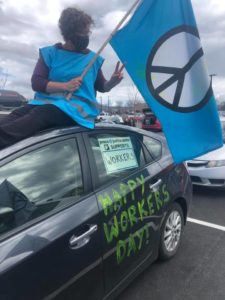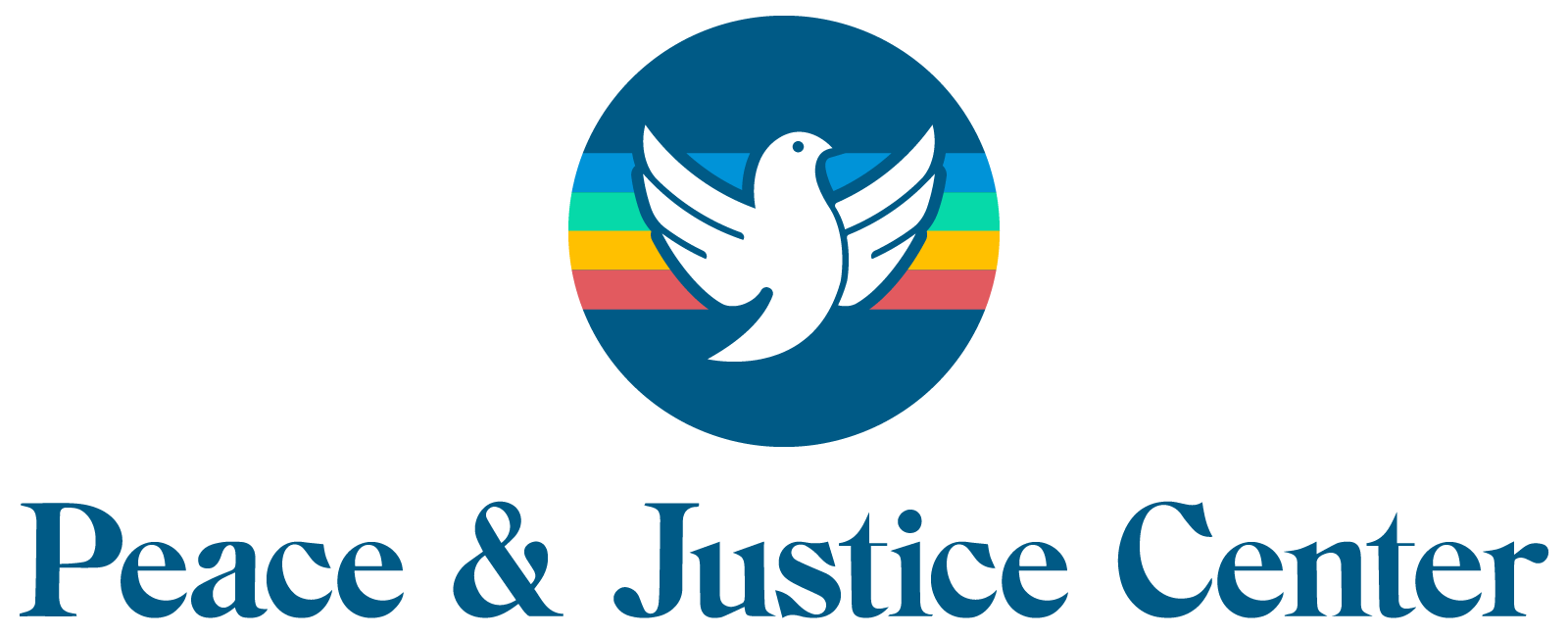 -by Rachel Siegel, Outgoing Executive Director
-by Rachel Siegel, Outgoing Executive Director
I have been reflecting and dreaming as I prepare for my last two weeks in this role at PJC. When I was hired in 2013, I met with Paij Wadley-Bailey, a mentor of mine. She told me that as a white person leading an organization that has racial justice at its core, there were two critical things I should do:
- Change the board composition to minimum 50% People of Color (there was one POC at the time)
- Create a paid Racial Justice Advisory Committee (RJAC) made up entirely of POC to whom we would be accountable and who would help guide our work.
We achieved that threshold on the board within a year and then changed the by-laws to uphold the commitment. These changes set us on a path for transformation. This has at times been a painful and bumpy ride, but so worthwhile.
A little history:
After the 2008 recession, the PJC (then 29 years old) almost tanked. Grants, store sales, and membership donations all diminished. When I was hired, the organization had no ED for two and a half years and prior to that, there was a series of short-lived EDs. The most stable time before that was when Serena Chaudhry was ED. She left in 2008.
I was hired at 20 hours a week and joined four other staff members. The work that was being done was profound and meaningful but without much structure. The staff were run ragged, working tremendously long weeks, and not supported the way they deserved. In addition to the paradigm shift to an organization that is better able to center and serve communities of color, we have also made a lot of logistical and mechanical changes. These changes support the staff and so are also related to that shift to a multiracial organization with more racial balance.
What we’ve done:
In our external work, we developed educational workshops and created our Educational Program Catalog. We created a fee schedule for groups that hire us and a sliding scale document for public programs. We have a cancellation policy, contracts, and processes in place to make sure this work is sustainable. We have implemented simple and valuable things like the use of timecards, written program reports, and evaluations. We articulated a store purchasing policy, staff agreements, and a theory of change. Our Allied Group program (fiscal sponsorship for other groups) has been further clarified and grown. (See the list here.) We have continued to iterate a supportive co-facilitation model to offer the most support possible to our POC facilitators. We made decisions to work for transliberation and to join the Boycott, Divestment, and Sanctions movement (BDS Israel) — both of which ruffled feathers. We began our annual trip to the Equal Justice Iniative’s museum and memorial in Montgomery, Alabama. We started a virtual store. We began an annual Pause to take stock of our work and connect with each other. Our inaugural annual BIPOC retreat happened last summer. Monthly staff breakfasts were a regular thing pre-COVID. We do some of our work in racial caucuses for both the board, the staff, and program participants. All of this work has been a collective effort that couldn’t have happened without the whole PJC community.
My decision to leave:
We have been slowly transforming into a more inclusive organization, especially regarding race and gender. We aim to bring joy into the work and allow time and space for healing and rest. I have seen over and over how much harder this work is for those most impacted. My decision to leave the organization was based on my desire for PJC to be as successful as possible in working toward our mission. As someone with multiple identities of privilege (most notably race and class) who benefits materially from these systems of oppression, I have significant barriers to finding solutions to them. Impacted people are best situated to address the conditions they are living in. (More on this in a blog post from a year ago.)
I announced this decision in December 2019 and the board started the process of hiring a new ED. When COVID hit Vermont in March 2020, I said I would stay on. We did not know if the Center would survive the storm and it was not a suitable time for leadership change. By the fall, we could see that COVID was not leaving quickly, we had adjusted our way of working and re-stabilized, and they started a new search. It is taking time to find the right person, but we are on our way. My last day will be April 9 but I will be here to help mentor the ED when they are hired if that is useful.
My hopes:
I hope that the PJC’s work to truly center those who have been most marginalized continues to be actualized. I hope that the organization becomes more trusted and useful to communities of color. I hope that the staff and board members of color feel supported and in community here. I hope that the anti-war and nonviolence programs have a resurgence as these are interconnected with anti-racism. I hope that more of the older white folks who have been “peace activists” for decades become open to the fact that identity impacts the way they work and that they will become more intersectional in their analyses and strategies. I would like the organization to be decidedly anti capitalist. Our Decarceration Statement says it well: policing practices at home uplift capitalist interests nationally and militarism abroad serves capitalism internationally. If we are working to end police and military violence, we need to work against extractive, racial capitalism. This also means that our fair trade programs and store would become recognized as relevant to more people. I would love for the problems and shortcomings of the nonprofit industrial complex to be articulated internally so the Center can best operate within our neoliberal reality.
In conclusion:
My last day as the Executive Director of the Peace & Justice Center will be April 9. I will miss this job. It has truly been an honor to work here. I have learned so much, especially from the People of Color and transfolk who I have worked with, but in general from our board, my coworkers, our Racial Justice Advisory Committee, our program facilitators, volunteers, interns, members, and community partners. I have been able to grow so much because of all of you. Thank you.
Lastly, I want to be clear, I am leaving this role at the PJC but I am not leaving this work. Although I am not the best suited to lead this work, I am needed. We are all needed. Together we can do what we cannot do alone!
